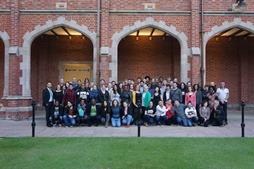Report from the My City Real World conference
2014.07.23. 06:00
 As a representative of The City is for All, I attended My City Real World, a conference organized in Belfast, Northern Ireland between June 26 and 28, 2014. Dozens of activists from various countries from Spain through Kenya and the United States to Brazil were present at the event. The topic was ethnic profiling, or the practice of the police to stop, check and search people with certain ethnic features.
As a representative of The City is for All, I attended My City Real World, a conference organized in Belfast, Northern Ireland between June 26 and 28, 2014. Dozens of activists from various countries from Spain through Kenya and the United States to Brazil were present at the event. The topic was ethnic profiling, or the practice of the police to stop, check and search people with certain ethnic features.
All the activists, volunteers and lawyers who participated in the conference work with organizations and movements that struggle for social justice and fight against police discrimination, violence and racism. In Hungary, the topic of ethnic profiling has been best addressed by the Helsinki Committee, while our group, The City is for All focuses on discrimination based on social status and class.
In 2011-2012, The City is for All completed Justice on the Streets, a study that confirmed the personal experiences of our homeless activists. Based on our survey with 400 street homeless people, it turned out that 59% of respondents had been subjected to some sort of police action within 30 days prior to the survey. A third of those who were stopped by the police experienced this more than four times, which means that the police stopped and ID’d them at least once a week. To illustrate the discriminatory nature of this situation: the non-homeless/middle-class members of The City is for All have not been stopped by the police for any reason for the past few years. Since the publication of our survey results, we have tried to address this issue in many ways including writing articles, compiling and distributing infographics and organizing a round-table discussion with the representative of the Budapest Police Department among others. We have also tried to create a closer collaboration with both the police and the national ambulance services – thus far with little success. We decided to attend the My City Real World conference because we are really interested in how other countries experience racial and class-based profiling and would like to learn about good practices, techniques, and methods for fighting against it.
The organizers of the conference chose the venue of the event very carefully. As we learnt from the staff of Public Achievement, the relationship between the police and the residents of Belfast had been heavy with tension and violence due to the ongoing conflict between the Protestant and Catholic residents of the city and the fact that the police force in Northern Ireland has been predominantly Protestant. While the armed conflict is officially over, the restructuring of the police force has been difficult to manage and many Catholic residents continue to mistrust the police. At the same time, many important changes have been implemented in the police department in order to transform it into a force that serves all residents of Northern Ireland. Besides renaming the department, new quotas were implemented which required the hiring of more Catholic police officers. Besides, two institutions were created that provide civilian supervision of the police and ensure that officers don’t abuse their power. The Police Ombudsman and the Independent Policing Board monitor the police department, investigate abuses of power and initiate steps to stop such further incidents. Over the past decade, these changes have resulted in great changes and even if there is still a lot of room for improvement in the Police Service of Northern Ireland, it seems to have shed its former quasi-military status and is now serving the entire population much better.
While there are many similarities in the forms of police abuse in the various countries represented at the conference, there are great differences between the specific legal environments and the extent of abuse. In almost all the European countries young black men are stopped more often than white and older people. In North America, people are not only stopped but also frisked, while in Brazil the police often become physically abusive and tens of thousands of people have died because of their actions (these instances usually go uninvestigated and their details are barely known). Hungary is among the European countries where the identity checks by the police are the most frequent, and a Roma Hungarian has a much greater chance of being stopped than a white person.
At the conference, workshops organized by the participants offered a very intense exchange of information. Among others, I attended the presentation of Fully Focused, a London-based organization, which supports youth in producing videos and other media products about their lives and questions relevant to them. One of the most well-known productions of this group is Riot from Wrong, which captures the 2011 riots in Great Britain from various angles, including the interpretations of young people who took part in the protests.
I also attended the presentation of Public Achievement’s WIMPS project (Where is My Public Servant) that links politicians with the youth they have been elected to represent. The presentation featured “job interviews” that young people completed with various candidates for local political positions. Members of this group also shoot movies, write articles, and support young people in holding their representatives accountable.
The third initiative I got to know was presented by the UK-based IDEA. In the workshop, we learnt about an experimental project organized in a small Dutch town between local youth and the police force. Over the course of a year, the two groups met monthly, talked about their experiences, and attempted to get to know each others’ hardships and viewpoints. According to the organizers, the initiative was very successful for all parties involved and although it was not clear whether the tensions between police and youth diminished due to this project, both sides reported that they appreciated getting to know and understanding the other better.
On the second day of the conference, I got to know three other organizations. Streetwise and Safe works with LGBTQ youth in New York, who are either homeless or live in other marginal situations. This organization played a key role in Communities United for Police Reform, a New York-based coalition of NGOs, which has worked hard since 2008 against the NYPD’s stop-and-frisk policy, a practice that has resulted in the unjustified police stops of tens of thousands of people of color without any reason. In the overwhelming majority of these searches no drugs, guns or any other violations have been found. The coalition compiled a list of their demands, which included the passing of a local ordinance, the so-called Community Safety Act, which would implement a greater oversight over the police and put an end to racial profiling. While City Council passed the act, Mayor Bloomberg vetoed it, which was then overridden by the Council. In a huge moment of victory, the Act was finally passed in 2013.
Also present at the conference was Amnesty International Brazil, which works against violence against young black Brazilians. The overall number of homicides in Brazil is extremely high and black people are disproportionately represented among the victims. The organization sheds light on state violence in Brazil and organizes educational projects in the favelas. Through the presentation, I also learnt about a relatively new cultural phenomenon called passinho, which is a dance style initiated by black youth living in the favelas. This dance expresses cultural identity and self-esteem and helps build communities.
In addition to Amnesty International, I also got to know a popular education organization called UneAfro that provides education to black and working-class Brazilians. In addition to preparing students to enter university, the organization is in close contact with the black movement and fights against the genocide of black people by the various authorities of the state, especially the police. In the case of this organization, I found the combination of education with anti-racist movement activism rather fascinating.
Stop les Controls au Facies is a French umbrella organization that works against discriminatory police practices. Among others, they have organized a campaign where they asked people to send a text message whenever they were stopped by the police and provide the details of the incident. They have also compiled a data sheet for the police to fill out every time they interact with citizens and the next step for the campaign is to enforce the use of this document by police.
The last organization I got to know was the Dutch Doetank, which collaborated with the rapper Gikkels to conduct a very interesting experiment. The organization sent a group of young black men and a group of young white men around in the city with hidden cameras. They wanted to see whether the black group got stopped by the police more often than the white group, while both groups were exactly the same thing. In the end, the white group was not stopped at all, while the black group did get stopped by the police. When one of the black men asked the police why they got stopped, the police officer said that they were suspicious. Then they asked the police officer whether they were stopped because of their skin color and the policeman replied that some groups are more prone to commit crimes than others...
At the conference, I had the opportunity to visit Community Restorative Justice Ireland (CRJI), one of the founders of which is a former political prisoner. The mission of this organization is to resolve conflicts and problems within the Irish community through non-violent means. Before 2007, the organization’s work had special importance, as the Sinn Fein (the Irish Republican party) was not willing to collaborate with the police and the Irish communities had to police themselves. At that time, the primary goal of CRJI was to prevent revenge killings and violent conflict-solving. Since Sinn Fein’s acceptance of the police as a legitimate authority, CRJI concentrates on social and mental health services and works towards the prevention of domestic abuse and suicide among others as well as mediation between the citizens and the police force. Of course the relationship between the organization and the police is not without conflict, and the police visited the offices of CRJI for the very first time just a short week before our visit.
Overall, these two days were very exciting and busy. It was interesting to get to know the situation in other cities both in and outside of Europe and learn about the relationship of minority communities with the police. As we had been hoping, getting to know these organizations and their work will help us in our fight against discrimination experienced by poor and homeless people in Hungary.
July 3, 2014 Tessza Udvarhelyi





